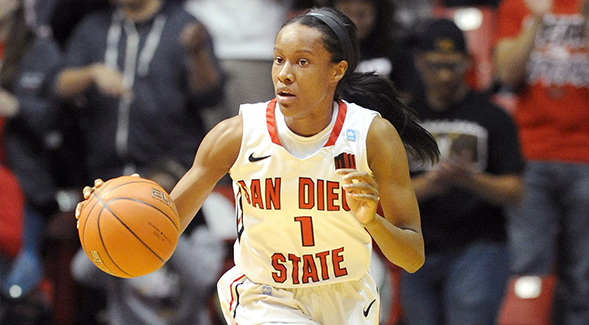Where Are They Now: Chelsea Hopkins
Former SDSU womens basketball player Chelsea Hopkins has established herself as one of the best players in Israel, winning multiple championships and a league MVP award.

Former San Diego State University women's basketball player Chelsea Hopkins only played for the Aztecs for two seasons after transferring from Duke University, but her name is scattered throughout the SDSU record books and including as part of two of the best teams in program history.
In her two years, Hopkins won the Mountain West Newcomer of the Year (2012) and Player of the Year awards (2013), helped the Aztecs win two conference regular season championships and has the top two single-seasons for total assists in program history.
After leaving SDSU with a bachelor's degree in public administration and a master's in business, Hopkins has embarked on a highly successful professional career. She had multiple stints in the WNBA and has established herself as one of the best players in Israel over the past seven years, winning multiple championships and a league MVP award.
The Las Vegas native, who is set to begin her eighth season in Israel next month, chatted with GoAztecs.com about her time at SDSU and her career overseas.
Looking back at your time at San Diego State, what are some of your favorite memories?
We had the most wins in a season in school history in the 2012-13 season (27) and we won two regular season conference championships. For me personally, I found myself. After transferring from Duke, where I had two knee injuries in five months and wasn't able to redshirt or get healthy, I found a home at San Diego State and was able to start over. They were very patient with me and very excited to have me there and I couldn't picture things working out any better than they did. I got healthy, elevated my game, won [Mountain West] Newcomer of the Year and Player of the Year, made the NCAA tournament, made lifelong friendships and earned a master's degree.
What do you think made those Aztec teams so successful?
We had a great group of girls who really liked each other. Sometimes you are around people that don't want to be there, but I remember us being super close. We hung out a lot off the court, which helped our chemistry, and we were able to hold each other accountable. We cared about each other as people and I think that translated to the court.
Take us through your career journey between your stops in the WNBA and Israel.
After two excellent seasons at San Diego State (2011-13), I went undrafted but got picked up as a free agent by San Antonio and finished the season with them. Then I started my first season in Israel with a team called Bney Herzliya, who I played with for two seasons. Pretty much every summer I had a WNBA opportunity. In 2014, I went to training camp with the Phoenix Mercury, but had an injury and came back to injury where I played with Maccabi Ramat Gan for the next two seasons. I had one of my best seasons there, I won the league MVP award and got a contract with the New York Liberty who I was with briefly. The following summer, I was with Atlanta for a 10-day contract. My most recent team was Maccabi Bnot Ashod, which is the top team in Israel, and I played with them the last three seasons. Then I played with the Chicago Sky for about a month and a half as a replacement player.
What was your time in the WNBA like?
Most of the opportunities in the WNBA were short lived. I was usually coming in as a replacement player or on a 10-day contract or signed for a duration of time while they wait for someone else to come back from overseas. I never really got to be me in the WNBA and show what I could do. It was always an arranged situation where I would come in for a couple weeks while this player is hurt and then when she comes back they let me go. But I'm still grateful for those opportunities in the WNBA.
How has your game evolved since you left San Diego State?
I use my mind a lot more. I just turned 30 and I don't have the athleticism or the speed I used to have when I was in college. What I've noticed is I'm still able to dominate because I'm thinking a lot more. I've been able to adjust to my body and to the fact that as you get older, you just can't rely on running and jumping. For me, I'm a big thinker of the game and I feel like I have a high basketball IQ.
What do you want to do when you are done playing?
I really want to transition into basketball operations. A lot of people have asked me about coaching or training, but I don't really know if that's for me. I really can't imagine life without basketball. I hope to work in an NBA front office one day and I've met a lot of people, so I feel like I have a good opportunity when the time comes.



